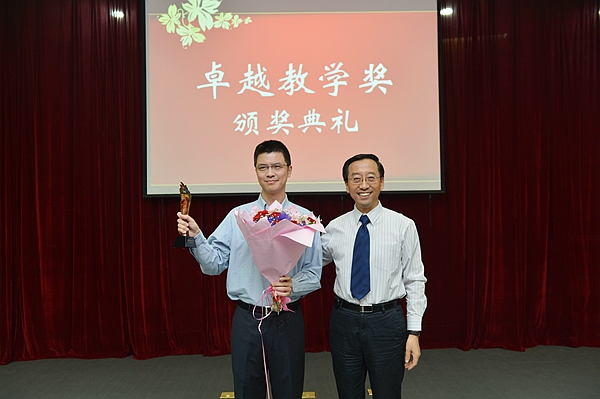The first SJTU Outstanding Teaching Award Ceremony was held at the JI Auditorium on September 15. President Zhang Jie attended and gave out the four prestigious awards, of which JI’s Prof. Jun Zhang is a winner.
The “Outstanding Teaching Award” has been established to improve the teaching quality of SJTU faculty, with emphasis on teaching excellence and promoting advanced cultural environment. The awards are sponsored by SJTU’s School of Continued Education, which aim to reward teachers who have dedicated themselves to helping students learn effectively. The selection of the winners is based on student evaluations of their teaching. This year, there were 31 candidates.
At the ceremony, each award winner was introduced by a video clip about their educational ideas and teaching methods, which showed their passion for teaching, dedication to students, and pursuit of perfection.

President Zhang recognized the achievements of the winners and their modeling effects on other SJTU faculty. He noticed the many young JI faculty members among the audience and encouraged them to emulate the winners. He hopes to see more winners of the Outstanding Teaching Awards from the audience.
Brief introduction of Prof. Jun Zhang
1997: Dr.Eng. in Automation, ShanghaiJiaoTongUniversity
2003: Ph.D. in EECS, University of California at Berkeley
2003-2010: working in research institutes and industry in the U.S.A.
2010: joining the UM-SJTU Joint Institute
Interview with Prof. Jun Zhang
Q: What kind of capabilities do you try to help your students develop?
A: Let me use my “Linear System” class as an example. In this class, I try to train the students’ critical thinking and self-challenge capabilities. “Linear System” targets the first-year graduate students. In the beginning, they may encounter two problems: (1) the class is conducted entirely in English, which the majority of students may not be used to, especially the technical terms in English; (2) the course is quite advanced; many students may not have the experience. Therefore, it is important to train students’ capabilities in critical thinking and self-challenge. Students may not know their potentials or limits, so we give them more pressure by teaching deeper contents and assigning more difficult problems, by which students realize they can reach a certain level by working hard. I think this kind of training is important and beneficial for students’ future in either the academics or the industry.
Q: Who influenced you to pursue the teaching career?
A: Throughout my education and work, I have encountered many people who have influenced me to become a teacher. The first are Profs. Guonian Shao and Yawen Zhang, who taught me “Mathematical Analysis” when I was a freshman at SJTU. Their teaching style was rigorous and meticulous. “Mathematical Analysis” is a very important fundamental course for freshmen, with a lot of topics and complex concepts. Both teachers were very thorough in delivering every topic and assigning critical homework problems for students to grasp the contents. They also devoted themselves to students outside of the classroom. There were three lectures per week. The two teachers would come the day before and stay overnight to answer our questions. They spent their free time working on problems, which had accumulated to thick bundles over time. I think their teaching method and work ethic set an excellent example of SJTU’s education style and tradition of starting high, solid foundation, and rigorous requirements. Another teacher that has influenced me is Prof. David Tse, who taught me “Random Process in communication systems” at UC Berkeley. His course emphasized logic and went straight to the core of the topics. Students can benefit by following his logic chain closely. His teaching style was the result of his achievement as a world famous specialist in the telecommunication. Therefore, I think the quality of a course has a lot to do with the teaching and research level of the teacher and the strength of the discipline in the university. I was lucky to have met these great teachers and have determined to be a good teacher as well.
Q: How do you evaluate your students?
A: My evaluation system is traditional, based on homework, midterm exam, and final exam. I emphasize midterm exam because it is a good way to understand how my students have learned half way through the semester, while final exam evaluates for the whole semester. For both examinations, I allow each student to bring a crib sheet, a piece of A4 paper to copy concise notes for quick reference. I don’t ask students to memorize formulae by rote; it is more important that they understand the concepts and know how to use them as tools.
Q: What is your idea about teaching?
A: The best teaching is the endless pursuit of perfection.





